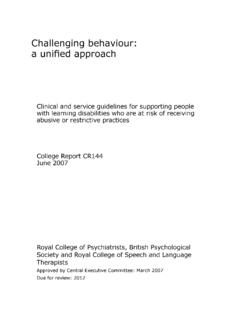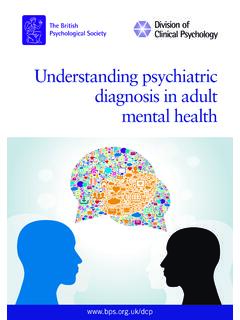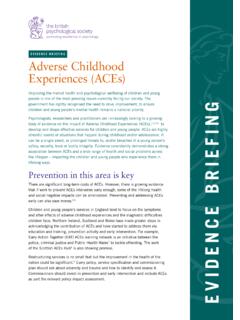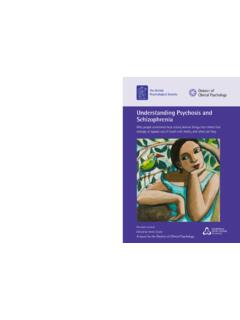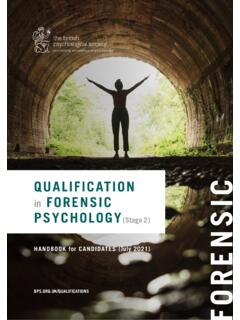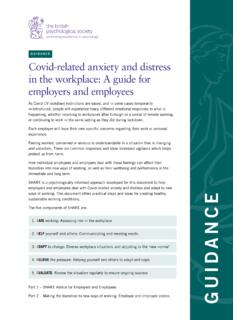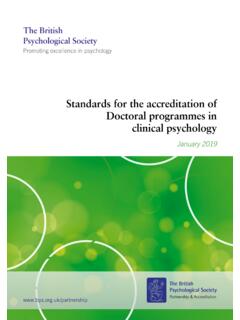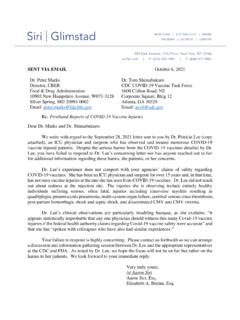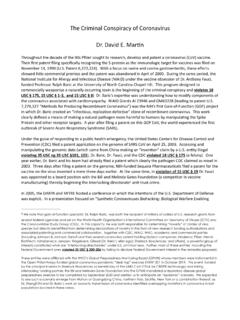Transcription of Race, culture and diversity
1 Edited by Dr Yetunde Ade-Serrano, Dr Ohemaa Nkansa-Dwamena & Dr Maureen McIntoshRace, culture and diversity A collection of articles9781854337498 ISBN 978-1-85433-749-8 Incorporated by Royal Charter Registered Charity No 229642 The British Psychological SocietySt Andrews House, 48 Princess Road East, Leicester LE1 7DR, UKTel: 0116 254 9568 Fax 0116 247 0787 E-mail: Website: , culture and diversity : A collection of articlesEdited by Dr Yetunde Ade-Serrano, Dr Ohemaa Nkansa-Dwamena & Dr Maureen McIntosh The British Psychological Society 2017 The views presented in this book do not necessarily reflect those of the British Psychological Society, and the publishers are not responsible for any error of omission or fact. The British Psychological Society is a registered charity (no. 229642).All rights reserved. No part of this book may be reprinted or reproduced or utilised in any form or by any electronic, mechanical, or other means, now known or hereafter invented, including photocopying and recording, or in any information storage or retrieval system, without permission in writing from the publishers.
2 Enquiries in this regard should be directed to the British Psychological Library Cataloguing-in-Publication DataA catalogue record for this book is available from the British 978-1-85433-749-8 Printed and published by The British Psychological Society St Andrews House 48 Princess Road East Leicester LE1 7DR iiiContents1 Foreword2 Introduction 5 Sense of self and the influence of culture : A psychological and personal perspective dr peter Martin17 Making sense of idioms of distress and cultural expression in psychotherapeutic practice Dr Maureen McIntosh32 Islam and counselling psychology: Soul to soul Dr Zakia Mahmood56 Modern feminism and counselling psychology: The danger of a single story considering Black women in feminism Dr Ohemaa Nkansa-Dwamena70 The essence of spirituality and its applicability to practice an alternative perspective Dr Yetunde Ade-Serrano 1 ForewordWe have produced this working booklet in the hope it will have some influence, contribute to the moving dialogue, and bring about a change in the thinking of and attitudes towards race, culture and difference, particularly within the areas of training, clinical practice and supervision.
3 Addressing the issue of culture within counselling psychology (and applied psychology) is an enormous task and goes beyond the scope of this booklet. Nevertheless, critiquing this subject area is of utmost relevance and significance to us and has implications for professional development. We all have a culture that is both diverse and unique, and is at the core of our multi-cultural society within the UK. Thus, the booklet is born out of illuminating areas of growth and a necessity to share in the cultural evolution of our current locality. The authors of this booklet have brought a wealth of experience and knowledge, offering contemplations, examining clinical work, and appraising topics that are of interest to them and meaningful for us all to reflect on. We thank all the authors for their fidelity and perseverance during the production of this by:Dr Yetunde , Chartered Psychologist, AFBPsSHCPC Registered Practitioner Counselling PsychologistRegistered EuroPsy PsychologistDr Ohemaa Nkansa-Dwamena , Chartered Psychologist, AFBPsSHCPC Registered Practitioner Counselling PsychologistDr Maureen , Chartered Psychologist, AFBPsSHCPC Registered Practitioner Counselling Psychologist2 DCoP Race, culture and diversityIntroduction Be the change that you wish to see in the world.
4 Mahatma GandhiCounselling psychology has grown over the decades, shaping its identity successfully, through its competencies, conscientiousness and the passion to make positive changes in the lives of people. Martin (2015) purports that cultural awareness is a central tenet of counselling psychology. Counselling psychologists are reflective and reflexive practitioners evolving both personally and professionally throughout the lifetime of their work with clients, within organisations, and communities. As scientist-practitioners the evidence we gain from these experiences informs the way we relate to all those we engage with. There has been a transition over the last five years in the terminologies used in this area: equality, diversity , etc. diversity as it is used within this booklet refers to a number of components including but not limited to gender, age, disability, sexuality, faith and/or religion, spirituality, race and ethnicity. culture is a fluid enterprise between individuals and communities creating an environment of shared values, principles and systems of function through learning.
5 Carriere (2014) believes that culture is cultivated; we propose that this phenomenon exists to bring together like-mindedness that is affirming. If the assertion that culture can be fluid is true, then, we could argue that culture cultivated in this way is not limited to the experience of cultural values within a specific ethnicity alone. Rather, culture can be across multi-ethnic groups including those from the dominant culture . We do acknowledge the silenced ethnicities and hope to give them a voice not just through our research or practice but also by our can we as practitioners move the agenda forward for all marginalised individuals? How can we be that change we wish to see in the world ? (Ghandi). How can we model acceptance and authenticity in our interactions when we work with clients from a different culture ? How can we make sure that as well as culture , all aspects of a persons life story is included within psychological formulations? Unfortunately, and despite all the research about culture and diversity issues, racism, and cultural adaptations to therapeutic practice ( : Rathod, Kingdon, Pinninti, Turkington & Phiri, 2015), certain ethnic minorities are still not accessing services, and are also more likely to be over represented within psychiatric hospitals.
6 Is there unacknowledged bias and discrimination against some social groups because they represent a racial and cultural group different from the majority?We postulate that in dialogue with colleagues on issues of equality, recognition and appreciation of difference, cognizance of our similarities and overlapping values of individuals/communities is needed. The colour of a person s skin, one s gender, disability, religious predisposition and language should not be used by others in making stereotypical assumptions about who, what or how the person is. In addition, awareness of one s own culture , biases, letting go of unhelpful assumptions being curious about the client history, and an openness to allow the client to teach us is the beginning of a worthwhile collaborative therapeutic relationship based on mutual respect. It is from this stance Introduction 3that this booklet was developed, and every author who contributed, did so with a desire to explore and highlight the nuances of working with individuals who hold multiple identities.
7 culture and diversity permeate every aspect of the work we do as psychologists, sometimes in the most subtle of ways. It is the presence of these which may facilitate themes of sameness and difference, a sense of belonging and otherness, and aspects of privilege and bias, all of which can affect the dynamic in therapeutic and supervisory work. culture and diversity also feed into research stances and processes, and can open up exploration in such a way as to encourage growth and movement. However, in the same vein, where the subtleties and complexities of culture and diversity are engaged with from too subjective a standpoint, there is a risk of perpetuating the unhelpful cycles we try to distance ourselves from when working with culture and diversity . We risk creating harm even though the intention of our obligations to our clients and others come from a meaningful such, it is important to bear the following in mind when reading this booklet: 1. culture is ever No one definition of culture encompasses what this will mean for any one individual at any given Cultural knowledge is an integral and continuous process.
8 4. culture is crucial and informs identity, attachment and engagement styles, it can be a template for culture is not language specific but is an expression of individual and or group experiences. 6. Lacking an awareness of race, culture and difference is is with the above that the papers in this booklet were curated, covering a wide range of experiences, research and clinical perspectives set within a counselling psychology context and narrative. It is hoped that in reading this booklet, readers will engage with a critical exploration of the meaning of culture and develop an understanding of its conscious and unconscious manifestations. Furthermore, the core aim of this booklet is to contribute to the development of awareness which can inform both clinical and research practice as well as consider different ways of engaging with individuals from a range of culturally diverse backgrounds. 4 DCoP Race, culture and diversityReferencesCarriere, (2014). culture cultivating culture : The four products of the meaning-made world.
9 Integrative Psychological and Behavioural Science, 48, 270 282. Gandhi, M. (2016). Quotes by Mahatma Gandhi. Retrieved May 2016 from , P. (2015). Cultural awareness in two UK counselling psychology settings: Initial training and supervision. The European Journal of Counselling Psychology, 3(2), 99 , S., Kingdon, D., Pinninti, N., Turkington, D. & Phiri, P. (2015). Cultural adaptation of cbt for serious mental illness: A guide for training and practice. of self and the influence of culture : A psychological and personal perspective 5 Sense of self and the influence of culture : A psychological and personal perspectivePeter MartinWhat is this article about?This article explores the self as it may apply to theoretical, existential and clinical situations, using my experience as a case study in the mutable self. The purpose of this article in a booklet produced by the Black and Asian Counselling Psychologists Group (BACPG) is to make a case for adventure, mistakes, the building of robust trust and respect, so that we can better serve and use our skills for the whole ever-changing community.
10 That is my might seem to be the very last person to be writing for this important booklet. I am white, English (very) late middle-aged, and male, and nowadays sort of middle-class. But so are you the very last person to be suitable to know about someone else. For we are engaged in similarity and difference, and above all in how these factors affect change in a sense of thanks for asking begin with a single case study, which explores cultural determinants and issues. I question the viability of any permanent sense of self, and eventually land on earth by adopting a pragmatic as if self-existed position, although from a post-modernist perspective. This is followed by an exploration of the underlying thinking behind social-constructionism, and its clinical implications. The consequent need to be equipped for uncertainty and unknowing is illustrated by the nature of responses to a recent piece of my research. This is followed by short clinical vignettes illustrating the importance of provisionality and pragmatism.
